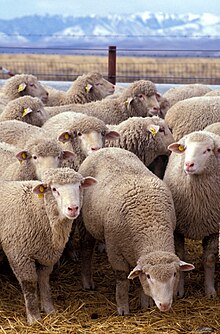- Arabies: شاة(ar) (sjaat)
- Bosnies: ovca(bs)
- Bretons: dañvad(br)
- Bulgaars: овца(bg) (owtsa)
- Deens: får(da)
- Duits: Schaf(de)
- Duits (Middelhoog-): ſchāf (gmh)
- Duits (Ou Hoog-): ſcāf (goh)
- Engels: sheep(en)
- Engels (Middel-): ſchepe
- Engels (Oud-): ſcēap (ang)
- Esperanto: ŝafo(eo)
- Faroëes: seyður(fo)
- Frans: mouton(fr)
- Goties: 𐌻𐌰𐌼𐌱(got) (lamb)
- Grieks (Dhimotiki): πρόβατο(el) (prowato)
- Grieks (Katharewoesa): πρόβατον(el) (prowaton)
- Grieks (Oud-): ὄις(grc) (oïs), πρόβατον(grc) (probaton)
- Ido: mutono(io)
- Iers: caora(ga)
- Iers (Oud-): cáera, ói, cit
- Italiaans: pecora(it)
- Kroaties: ovca(hr)
- Latyn: ovis(la)
- Lets: aita(lv)
- Litaus: avis
- Luhya: likhese
|
|
- Luxemburgs: Schof(lb)
- Moldawies: oaie
- Nederlands: schaap(nl)
- Noors: sau(no)
- Noors (Oud-): sauðr, fær
- Persies (Oos-): گوسفند(prs) (ghosfand)
- Persies (Wes-): گوسفند(fa) (ghoesfand)
- Pools: owca(pl)
- Portugees: ovelha(pt)
- Roemeens: oaie(ro)
- Russies: овца(ru) (owtsa)
- Serwies: овца(sr) (ovca)
- Spaans: oveja(es), (Ecuadoriaans ook:) borrego(es)
- Swahili: kondoo(sw)
- Swazi: imvu(ss), (Europese skaap:) sihhuku(ss)
- Sweeds: får(sv)
- Tsjeggies: ovce(cs)
- Turks: koyun(tr)
- Turks (Osmaans): قويون(osm) (koyun)
- Venda: nngu
- Volapük: jip(vo)
- Wallies: dafad(cy)
- Xhosa: igusha
- Yslands: kind(is), sauðkind(is), sauður(is)
- Zoeloe: imvu(zu), (Europese skaap:) isiklabhu(zu), igusha(zu)
|
